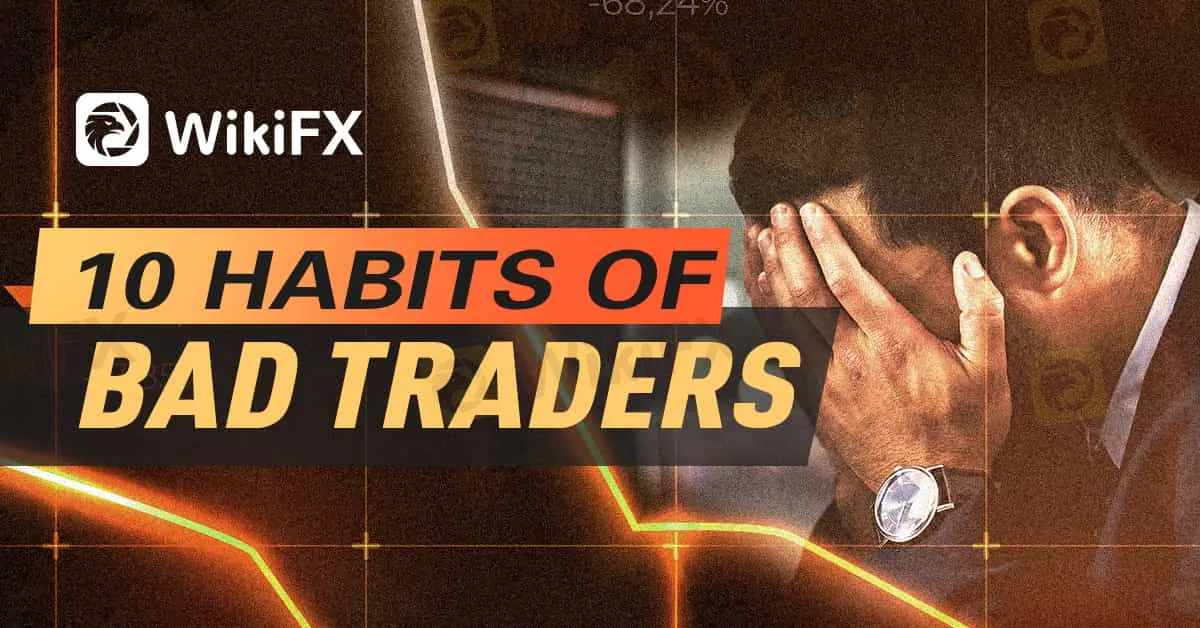简体中文
繁體中文
English
Pусский
日本語
ภาษาไทย
Tiếng Việt
Bahasa Indonesia
Español
हिन्दी
Filippiiniläinen
Français
Deutsch
Português
Türkçe
한국어
العربية
10 Habits of Bad Traders
Abstract:Forex trading can be unforgiving, especially for traders who possess certain habits that can lead to substantial losses. In this article, we'll explore ten habits that characterize bad traders in Europe and ways to avoid them.

Forex trading can be unforgiving, especially for traders who possess certain habits that can lead to substantial losses. In this article, we'll explore ten habits that characterize bad traders in Europe and ways to avoid them.
Overtrading: Bad traders have a compulsion to trade excessively, even when market conditions are unfavorable. This habit leads to increased transaction costs and potential losses.
Ignoring Risk Management: Bad traders often neglect risk management, putting a significant portion of their capital at risk on a single trade without proper risk control measures.
Lack of Patience: Impatience can be detrimental in forex trading. Bad traders jump into trades hastily without waiting for suitable entry and exit points.
Emotional Trading: Bad traders allow emotions to govern their decisions, leading to erratic trading behavior based on fear or greed.
Greed for Quick Profits: Bad traders seek quick profits and often engage in high-risk strategies, neglecting the importance of sustainable and consistent growth.
No Trading Plan: Bad traders lack a well-defined trading plan and often trade impulsively without a clear strategy in mind.
Ignoring Market Analysis: Instead of conducting thorough analysis, bad traders rely on hearsay or gut feelings, leading to uninformed decisions.
Revenge Trading: After experiencing a loss, bad traders engage in revenge trading, trying to recoup their losses quickly. This approach rarely ends well.
Lack of Learning: Bad traders are resistant to learning and improvement. They refuse to acknowledge mistakes and miss out on opportunities to grow.
Not Seeking Reliable Resources: Bad traders miss out on valuable resources like WikiFX, which provides crucial information, broker reviews, and educational content to help traders make informed decisions. Avoid these bad habits and check out WikiFX today to enhance your trading knowledge and skills.

Disclaimer:
The views in this article only represent the author's personal views, and do not constitute investment advice on this platform. This platform does not guarantee the accuracy, completeness and timeliness of the information in the article, and will not be liable for any loss caused by the use of or reliance on the information in the article.
Read more

New to Forex Trading in India? Here's How You Can Start and Maximize
Want to begin your forex trading journey in India? Here's a guide that will help you open and close trading positions effectively, resulting in enhanced returns and minimized risks.

How a TikTok Crypto Scam Cost One Investor RM84,000
A Malaysian woman has lost RM84,000 after falling prey to a cryptocurrency investment scam promoted through the social media platform TikTok. The 52-year-old victim was lured into the scheme by a fraudster posing as an investment advisor, according to police reports filed earlier this week.

Manual vs. Automated Forex Trading: Which One Should You Choose?
Both manual and automated forex trading have their strengths and weaknesses. Should you trade manually or use automated systems? Today’s article may give you some clues.

IFC Markets: The Broker With No License!!
When evaluating a forex broker, regulatory status is one of the most important indicators of credibility and investor protection. In the case of IFC Markets, WikiFX’s findings raise several red flags that potential traders should carefully consider before engaging with this platform.
WikiFX Broker
Latest News
US Government Interest Grows in Victory Metals’ Rare Earths Supply
How Are Trade Policies Affecting the Aluminum Market?
RM71,000 Lost in a Share Scheme That Never Existed
Scammed by a Click: He Lost RM300,000 in a Month
Manual vs. Automated Forex Trading: Which One Should You Choose?
Revealing Factors That Help Determine the Gold Price in India
Why Regulatory Compliance Is the Secret Ingredient to Trustworthy Forex Brokers
Pentagon to become largest shareholder in rare earth miner MP Materials; shares surge 40%
Delta shares jump 12% after airline reinstates 2025 profit outlook as CEO says bookings stabilized
Delta shares jump 13% after airline reinstates 2025 profit outlook as CEO says bookings stabilized
Currency Calculator


